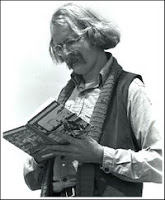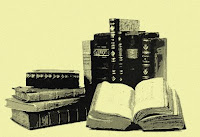
Even the stingiest of our poets seem to work in earnest to make their minor-key efforts seem like treatises about the objects they 've chosen to make their subject. A banal, everyday image to open, a bit of conversation, an incidental gesture, a memory that is generated, some arcane reference to a philosophical truism, freshly lifted from a directory of over used quotes, to make the whole thing resonate with the semblance of larger import, and then a return to the image from which the enterprise started, hopefully altered for the way the poet has talked his idea into submission.
Even in the concise poems of Billy Collins one can sense an autodidact chomping at the bit to unload the sophisticated reading they've done to invest in such slim prophecies. One senses what was left unsaid, and that makes for an unsatisfying work, compromised between desires. And John Koethe strikes you as a junior league
Pound, the last guest to leave the party . But not the late Richard Brautigan--too much of a whimsical clown half the time, given to quick sketches and half-bright paragraphs, Brautigan could still pull perceptual beauty from situations where there was nothing going on. At his most sublime , he was the laureate of what hadn't been thought through. His intention appeared to be to stop writing before intellection kicked in and larded up what was already a choice, uncluttered perception of what he saw, what he felt, what he thought in the instance of perception.
Your Catfish Friend
by Richard Brautigan
If I were to live my life
in catfish forms
in scaffolds of skin and whiskers
at the bottom of a pond
and you were to come by
one evening
when the moon was shining
down into my dark home
and stand there at the edge of
my affection
and think, "It's beautiful
here by this pond. I wish
somebody loved me,"
I'd love you and be your catfish
friend and drive such lonely
thoughts from your mind
and suddenly you would be
at peace,
and ask yourself, "I wonder
if there are any catfish
in this pond? It seems like
a perfect place for them."
Richard Brautigan--he is happy to remain slight, a poet who can deliver the payload he has without seeming, at his best, to be serving another poet's muse. Zen, I suppose, is the first thing I think of, a what-if scenario that rather joyfully plays with a Muddy Waters catfish metaphor and transforms a blistered, haggard blues trope into a suddenly wonderfully state of being awestruck. One goes along with this and is impressed with the way the narrator can suppose he were a catfish, imagine the thoughts of the woman he is addressing, and land the final perception in some notion that is unrelated to the teller's implied desire and lust but is linked, entirely appropiate, all of a piece"
"I wonder
if there are any catfish
in this pond? It seems like
a perfect place for them."
This pond, as imagined, is the perfect place for these people and their musings--a superb bit of half a notion given a full and complete voice. An awesome thing, this poem.





